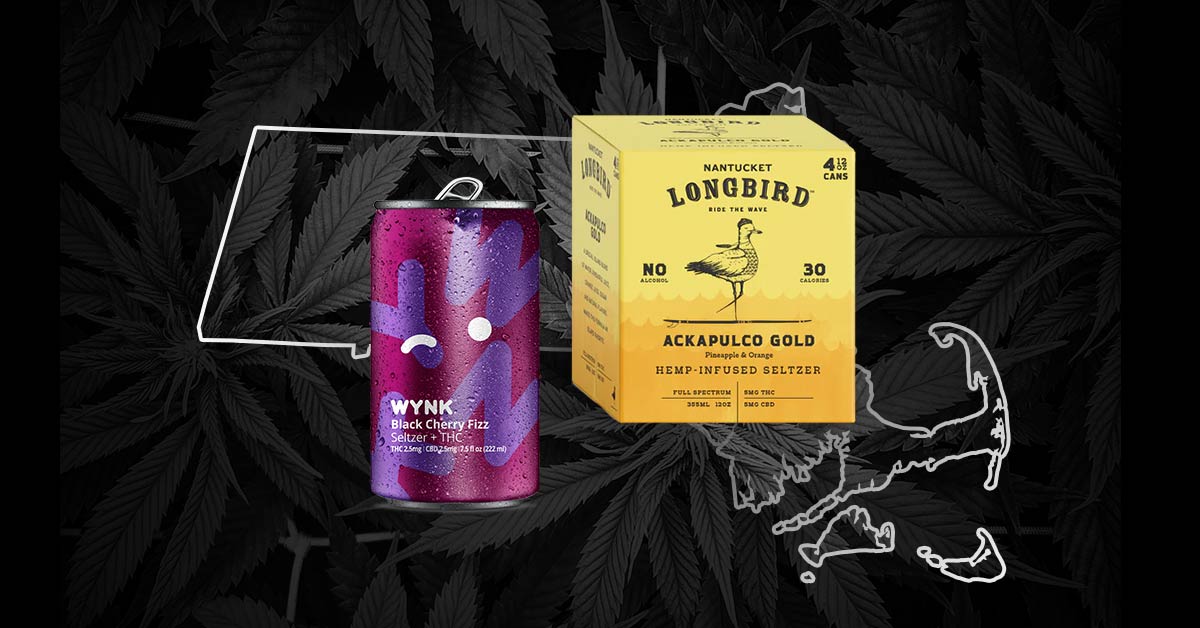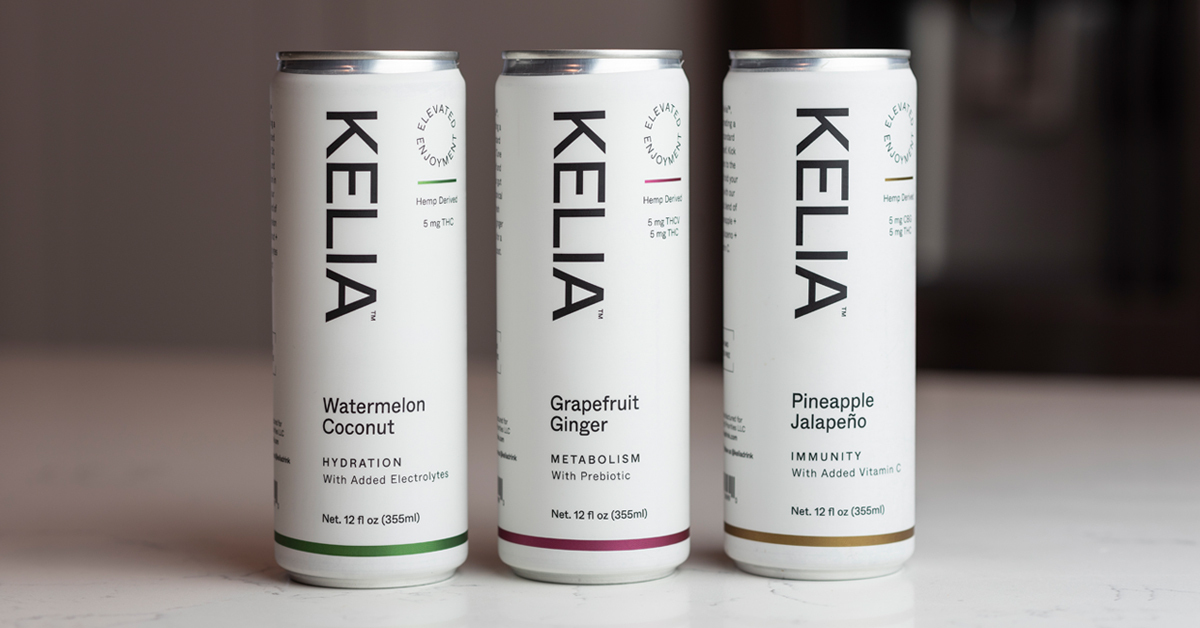Massachusetts regulators have officially put an end to the sale of hemp-derived CBD and THC (both delta-8 and delta-9) in licensed beverage-alcohol retailers.
A joint statement by the Massachusetts Department of Public Health (DPH) and Department of Agricultural Resources (MDAR) issued last Thursday through the state’s Alcoholic Beverages Control Commission (ABCC) declared it “unlawful to manufacture and/or sell food or beverages” containing hemp-derived cannabinoids, applying to both alcoholic and non-alcoholic beverages.
The memo does not apply to cannabis products which are regulated by the Cannabis Control Commission (CCC) and applies to all retailers and distributors that fall under Massachusetts law for Regulations for Good Manufacturing Practices for Food, or 105 CMR 500.00.
Though it might seem like a revision of the state’s policy on hemp-derived ingredients, the notice explicitly lays out that it is announcing the intention of enforcing pre-existing policy in regards to the loophole opened up in the 2018 Farm Bill.
“The Farm Bill, however, did not remove the existing federal prohibition of adding CBD or THC to food or beverages. This prohibition still exists regardless of whether the CBD or THC is hemp derived,” the memo states.
An Uncertain Future For Hemp In The Bay State
The news is an “unfortunate” setback for hemp beverage suppliers because it puts consumers at a disadvantage, said hemp beverage veteran Matt Melander, co-founder of Levia and recently launched Nantucket Longbird.
“There is a subset of the population who are not comfortable shopping in a dispensary because they feel as though it’s a criminal behavior,” he said. “By putting something that is a plant based alternative to alcohol into normalized commerce, you’re continuing to break that stigma.”
Dispensaries have never been the ideal channel for beverages because they do not house the infrastructure to warehouse and merchandise large volumes of liquid in cans. Additionally, there is little thirst among dispensary clientele for the low-dose format (2mg to 5mg THC) that most hemp-derived products offer.
When it comes to marijuana-derived THC beverages, California is far-and-away the biggest market with sales of $108.4 million in 2023, representing 31% of the total U.S. THC drinks market, according to data provided by Brightfield Group. Massachusetts is the fifth largest with dispensary channel sales hitting $20.3 million.
THC beverages in Massachusetts represent just over 1% of cannabis sales, according to tracking from Headset.io.
Where will these hemp-derived THC products go if they can’t be in retail? They’ll “go to what works,” says Melander.
“Direct-to-consumer is a great place to still work within this market in a compliant manner,” he said. “The Department of Public Health cannot regulate what I have shipped to my front door.”
Sarah Patel, founder of Massachusetts-based brand KELIA, said that high costs for manufacturing, distribution and marketing make it financially difficult to work in the state. The company recently pivoted out of dispensaries to a hemp-derived delta-9 THC version because of the opportunity to sell that product online across state lines.
“I don’t know that it’s necessarily hard to be a brand in Massachusetts. But traditionally, we’ve seen better growth [for low-dose THC drinks] in liquor stores and dispensaries,” she said. “In order for beverages to work, you need to be able to sell in volume…I didn’t see any other choice but to make a hemp beverage and wait to see what happens and then reassess Massachusetts.”
The Northeast region represented about 16.2% of hemp-derived THC drink sales in 2023 with the South (56.8%) and Minnesota state over indexing beverage usage, according to Brightfield Group.
Different States, Differing Regulations
The DPH/MDAR notice follows a similar approach to a recent announcement from the Arizona Attorneys General’s office reiterating the illegality of hemp-derived THC products.
Other states have taken a different tactic to tamp down on hemp-derived THC products sold in convenience stores and retail chains by using legislation to impose age restrictions and dosage limits. Iowa passed a law that limited THC in hemp products to 4mg, while in Connecticut legislators have proposed a bill bringing that number down to 1mg per serving.
Illinois is currently debating its own set of proposals for regulating hemp products along with similar bills in Virginia and Florida.
A December report from data company BDSA laid out both the opportunity and risk that intoxicating hemp products have had on the cannabis industry and the various statewide approaches that have begun to sprout up.
“The long-term implications of these decisions will begin to emerge in 2024 as state and federal regulators struggle to catch up to the nuance of the existing regulatory frameworks, and intent versus application of current and future regulations…a lack of regulation also provides ample opportunities for unintended consequences and increases risk of unsafe products reaching consumers.”
With many states putting in place new regulations or revising previous policies, it might seem like the hemp landscape is changing rapidly. But “the roller coaster, as we started referring to it,” said cannabis legal expert and Vicente LLP partner Michelle Bodian, “is the same as it’s been each year for the past five years since really the commercialization of hemp and hemp derivatives in the 2018 Farm Bill.”
So why has Massachusetts chosen to use the DPH, MDAR and ABCC to regulate the hemp industry in the Bay State?
“It’s the only effective enforcement mechanism that’s available because the state hasn’t addressed these products affirmatively through regulation at the state house,” said Adam Olivieri, co-founder of bev-alc distributor Craft Collective.
Inaction on the legislative front is to blame for the “selective enforcement” that is now being carried out through Massachusetts’ ABCC which is counter to the “affirmative regulation” that the hemp industry has been asking for, said Olivieri, who also is president of the Adult Beverage Alliance (ABA), a New England-based delta-9 THC beverage industry group launched earlier this year.
The ABA along with other cannabis trade groups like the Hemp Beverage Alliance and the Cannabis Beverage Association are all lobbying various states that are in the process of formalizing hemp food and beverage legislation.
Olivieri said that the ABA is still consulting with Massachusetts state legislators to formulate and amend bills that would allow hemp beverages to return to retail store shelves.
Forging Opportunity For All
From the perspective of at least one licensed dispensary operator, Theory Wellness – which has made a big bet on beverages with its drinks-only storefront – the DPH/MDAR notice is not about pushing out hemp products but about enforcing a law that was already in place.
“It shouldn’t be that controversial for companies to be told to follow the laws that exist,” said Brandon Pollock, CEO and co-founder of the MA-based company, which operates dispensaries in multiple states on the East Coast. “What is controversial, is what do we do moving forward?”
Pollock said that he hopes this will open the issue up to a broader conversation about how to regulate hemp so it is on an equal footing to the regulations, testing and taxes that licensed marijuana operators need to abide by.
Under current Massachusetts law, licensed dispensaries are not allowed to produce hemp-derived products for sale outside of the state or purchase hemp products from other states.
“It shouldn’t be a situation where there are liquor stores selling products from out-of-state and local businesses can’t produce and sell into that market. That doesn’t really seem sensible,” Pollock said.
“We welcome regulations,” added Phil McFarland, general manager of Wherehouse Beverage Co., which makes products for both the regulated and hemp-derived market. “Age-gating standards. Transparency. Certificate of analysis. These kinds of basic attributes to a regulatory framework. We’re hungry for them.”
Another thing that the many stakeholders in the industry can agree on is that a “common-sense framework” for state-level hemp beverage regulation does exist.
“Minnesota has done the experiment. The data is in, the tax revenues, the safety data, the incidence of issues are all available,” he said. “I don’t know why more people aren’t looking at the Minnesota framework, because it just makes a ton of sense.”

